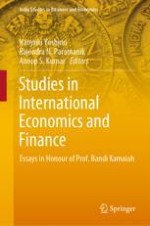2022 | OriginalPaper | Chapter
Trade, Unemployment and Inequality in Product Variety Models—An Analytical Survey
Authors : Sugata Marjit, Meghna Dutta
Published in: Studies in International Economics and Finance
Publisher: Springer Singapore
Activate our intelligent search to find suitable subject content or patents.
Select sections of text to find matching patents with Artificial Intelligence. powered by
Select sections of text to find additional relevant content using AI-assisted search. powered by
